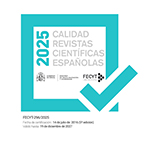The distributed human. Extended cognition, material culture and technological turn in philosophical anthropology
Abstract
This article evaluates the consequences of the extended cognition thesis for philosophical anthropology. This examination is part of what we call the technological turn in social and human sciences, a relatively recent phenomenon that leads to a posthumanist reorientation of the anthropological question. According to this turn, technology becomes a key factor in understanding the human being, both in its ontological dimension and its present historical condition. In turn, this technological shift tends to reject the very idea of an ahistorical and impenetrable human nature, postulating instead the figure of the “distributed human being”, intimately constituted by its relationship with artifacts and material culture. In this context, the main objective of this work is to trace the evolution of the extended cognition thesis along four “waves”, in order to offer a certain reinterpretation of this thesis in the context of the anthropological question.
Downloads
Article download
License
In order to support the global exchange of knowledge, the journal Revista de Filosofía is allowing unrestricted access to its content as from its publication in this electronic edition, and as such it is an open-access journal. The originals published in this journal are the property of the Complutense University of Madrid and any reproduction thereof in full or in part must cite the source. All content is distributed under a Creative Commons Attribution 4.0 use and distribution licence (CC BY 4.0). This circumstance must be expressly stated in these terms where necessary. You can view the summary and the complete legal text of the licence.












